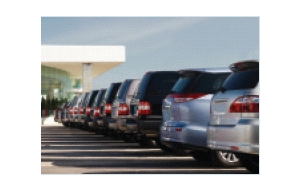US cars: End of the road for SUVs?
 Plummeting sales of gas-guzzling sports utility vehicles in the US is welcome news to greens but has little to do with climate change concerns.
Plummeting sales of gas-guzzling sports utility vehicles in the US is welcome news to greens but has little to do with climate change concerns.In a nation as vast as the US, where individual states are bigger than many European countries, and the “Sunday drive” has long been a form of entertainment, big cars have been the norm. But with the price of gasoline on a seemingly unstoppable rise, Americans are ditching their big sports utility vehicles and pickup trucks in droves in favour of smaller “crossovers” – cars with some SUV-like features – and conventional cars.
According to vehicle trends tracker Autodata, sales of large SUVs were down 28 per cent in the first quarter this year, while subcompact sales rose 32 per cent. SUV sales peaked in 2003 at three million, but are expected to reach only half that number this year.
Passenger car sales rose 4.5 per cent in April, but light trucks, including pickups, minivans, SUVs and crossovers, fell 7.2 per cent, the biggest drop since 1999.
On 1 May, General Motors, Toyota and Chrysler all said during their announcements of April figures that they expected pickup truck sales to bounce back. But Ford, which produced a first-quarter profit of $100 million and saw its stock jump nearly 10 per cent, disagrees. It believes the segment will see additional declines in the months to come and will never return to their record levels, when full-size pickups were 15 per cent of total US sales.
GM has eliminated shifts at several of its pickup and SUV plants to “align its production with market realities”. And the reality is that small cars are now the largest segment of the US auto market – 18 per cent of new car sales.
According to investment strategist James Stewart, Ford may be better positioned than others to weather high gas prices. It offers one of the first hybrid SUVs introduced, the Escape, and several popular crossovers.
Although concern for the environment is gaining attention, Mike DiGiovanni, GM’s executive director of global markets and industry analysis, says fuel prices are driving the small car boom in the US. Ford says the shift away from SUVs has been accelerated by high fuel costs, but “was going to happen anyway” as baby boomers with emptying nests trade in larger vehicles and the demand for work trucks falls with the stagnating housing market. Chrysler believes pickups will eventually recover, but that carmakers must come up with more fuel-efficient models.
According to US Energy Department data the high cost of gasoline is causing Americans to drive less for the first time in more than 30 years. Many are cycling or sharing rides. Chris Knittel, a University of California Davis economist, says that as drivers turn away from SUVs and cut back on their driving it could mean reductions in gasoline use by US drivers by about 7 per cent for every $1 increase in the price per gallon and a reduction in carbon dioxide emissions of tens of millions of tonnes a year.
Americans certainly trumpet their concerns for the environment, but it seems that it is the hit from gasoline prices on wallets that is driving the majority towards smaller, more fuel-efficient cars.
You can return to the main Market News page, or press the Back button on your browser.

